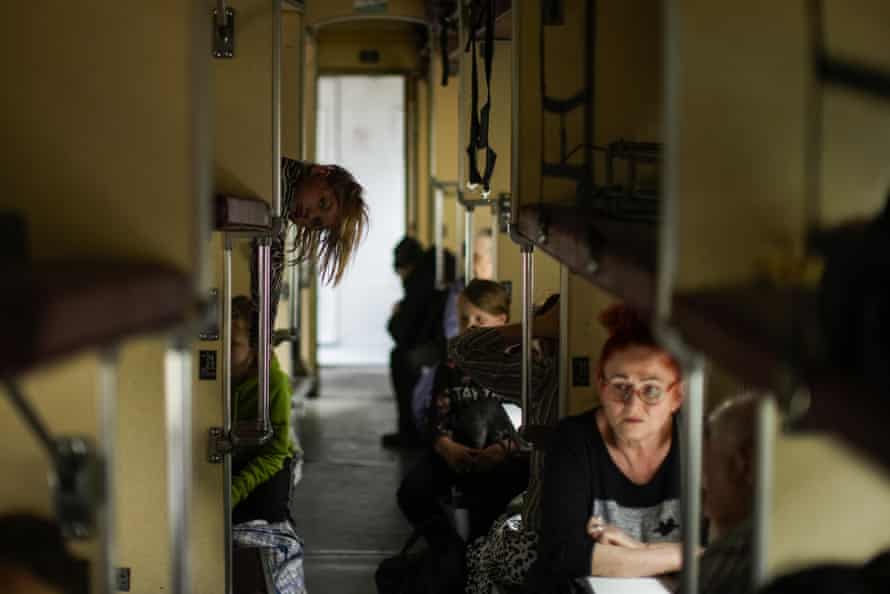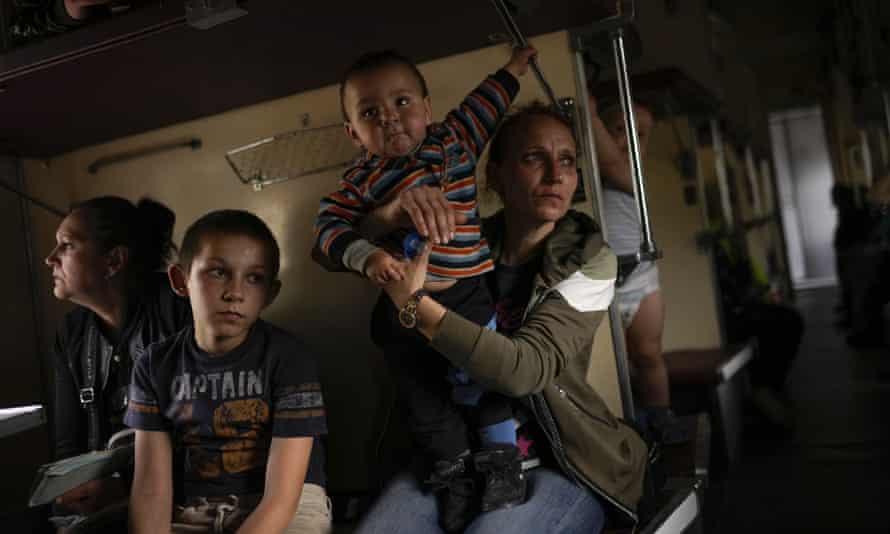Russia-Ukraine war latest: Russia intensifies assault on Sievierodonetsk; Zelenskiy to address EU leaders – live
Russia intensifies assault on Sievierodonetsk
Officials in eastern Ukraine have said Russian shelling of Sievierodonetsk has been so intense that it has not been possible to assess casualties and damage, as Moscow closes in on the largest city still held by Ukraine in the Donbas.
Fighting is believed to be taking place in the streets and “the entire critical infrastructure” of the city has been destroyed, according to president Zelenskiy.
Ukrainian authorities have described conditions in Sievierodonetsk as reminiscent of Mariupol.

In Zelenskiy’s latest national address, the Ukrainian president said:
As a result of the Russian strikes at Sievierodonetsk, the entire critical infrastructure of the city has already been destroyed. 90% of houses are damaged. More than two-thirds of the city’s housing stock has been completely destroyed. There is no mobile connection. Constant shelling.
Capturing Sievierodonetsk is a fundamental task for the occupying contingent. And they don’t care how many lives they will have to pay for this attempt to raise the Russian flag on 32 Druzhby Narodiv boulevard (Friendship of Nations – ed.) – no matter how bitter the name sounds now – where the Sievierodonetsk administration is located.
We are doing everything to repel this offensive.”
The battle for Sievierodonetsk, which lies on the eastern bank of the Siverskyi Donets River, about 145km (90 miles) south of the Russian border, is in the spotlight as Russia grinds out slow but solid gains in the industrial Donbas, which comprises the Luhansk and Donetsk regions.
“They don’t care how many lives they will have to pay for this,” Zelenskiy said in his latest national address, referring to Russian forces in the region.
Regional officials reported that Russian forces were “storming” Sievierodonetsk and that fighting was taking place street by street, knocking out power and mobile phone services.
Sievierodonetsk’s mayor, Oleksandr Striuk, said those residents remaining in the city, which had a prewar population of about 100,000, risked exposure to shelling when they left their homes to access water. Striuk has estimated that 1,500 civilians have already died either from Russian attacks or from a lack of medicine and diseases that couldn’t be treated.
Summary and welcome
Hello. I’m Samantha Lock and welcome to our live coverage of the war in Ukraine.
European Union leaders will meet in Brussels today in an attempt to make progress on an embargo of Russian oil. Officials have so far failed to come to an agreement, debating whether to water down a ban on Russian oil imports to placate Hungary’s leader, Viktor Orbán, who is blocking the latest sanctions. Ukraine’s president Volodymyr Zelenskiy is set address the summit by video link.
Russian foreign minister Sergei Lavrov has denied speculation that president Vladimir Putin is ill. “I don’t think that sane people can see in this person signs of some kind of illness or ailment,” Russia’s top diplomat said.
If you’re just waking up or dropping in to catch up on what’s been happening, here are some of the latest developments:
- Officials in eastern Ukraine say Russian shelling of Sievierodonetsk has been so intense that it has not been possible to assess casualties and damage, as Moscow’s forces close in on the largest city still held by Ukraine in the Donbas. Fighting is believed to be taking place in the streets and “the entire critical infrastructure” of the city has been destroyed, according to president Volodymyr Zelenskiy. Ukrainian authorities have described conditions in Sievierodonetsk as reminiscent of Mariupol.
- The “liberation” of Ukraine’s Donbas region is an “unconditional priority” for Moscow, while other Ukrainian territories should decide their future on their own, Russian foreign minister Sergei Lavrov said, according to a release from Russia’s foreign ministry.
- Zelenskiy visited troops in Kharkiv and toured the country’s second-largest city to see damage by Russian forces in the Ukrainian president’s first official appearance outside the Kyiv area since the start of the war. “Kharkiv suffered terrible blows from the occupiers … One third of the Kharkiv region is still under occupation,” he said. According to local officials, more than 2,000 apartment blocks have been wholly or partially destroyed by Russian shelling in the region.
- About 31% of the Kharkiv region’s territory is occupied by Russian forces while 5% has been liberated by Ukrainian defenders, the head of the Kharkiv regional military administration said. “We are not yet able to fully inspect some of the liberated settlements, conduct full-fledged de-mining and begin rebuilding critical infrastructure, as shelling continues. Where we can do it remotely, we do it,” Oleg Synegubov said, according to a release from the president’s office.
- Zelenskiy said he has fired the head of the state security service in Kharkiv for not working to defend the city, adding that “law enforcement officers” are now involved. “I came, figured out and fired the head of the security service of Ukraine of the [Kharkiv] region for the fact that he did not work on the defence of the city from the first days of the full-scale war, but thought only about himself,” the president said in his daily national address. “On which motives? The law enforcement officers will figure it out.”
- The European Union failed to agree on an embargo of Russian oil during talks on Sunday while debating whether to water down a ban on Russian oil imports to placate Hungary’s leader, Viktor Orbán, who is blocking the latest European sanctions. However, diplomats said they would still try to make progress ahead of a Monday-Tuesday summit on an exemption for pipeline deliveries to landlocked Central European countries. Zelenskiy is set to speak by video link to EU leaders in Brussels on Monday.
- The German economy minister, Robert Habeck, raised concerns that European Union unity on new sanctions against Russia was “starting to crumble”. “After Russia’s attack on Ukraine, we saw what can happen when Europe stands united. With a view to the summit tomorrow, let’s hope it continues like this,” he told a news conference on Sunday. “But it is already starting to crumble.”
- Russia will continue to supply gas to Serbia, after a phone call between the Russian president and his Serbian counterpart. Aleksandar Vučić said he agreed a three-year gas supply contract with Putin, with further details to be finalised with producer Gazprom.
- Russia is continuing to ship gas to Europe through Ukraine, Gazprom has confirmed. The Russian gas producer said its supply via the Sudzha entry point stood at 44.1m cubic metres, up from 43.95m on Saturday.
- Lavrov has denied speculation that president Vladimir Putin is ill. Answering a question from France’s broadcaster TF1, Agence France-Presse quotes Russia’s top diplomat as saying: “I don’t think that sane people can see in this person signs of some kind of illness or ailment.”
- Zelenskiy said he believed Russia would agree to talks if Ukraine could recapture all the territory it had lost since the invasion. However, he ruled out the idea of using force to win back his land. “I do not believe that we can restore all of our territory by military means. If we decide to go that way, we will lose hundreds of thousands of people,” he said.
- Nato is no longer bound by past commitments to hold back from deploying its forces in eastern Europe after Moscow “voided of any content” the Nato-Russia Founding Act, the US-led alliance’s deputy secretary general, Mircea Geoana, told Agence France-Presse.
- Ukraine has started receiving Harpoon anti-ship missiles from Denmark and self-propelled howitzers from the US. “The coastal defence of our country will not only be strengthened by Harpoon missiles – they will be used by trained Ukrainian teams,” Ukrainian defence minister Oleksiy Reznikov said.
- Poland has also agreed to send artillery to Ukraine, Polish state media reported.

Share this news on your Fb,Twitter and Whatsapp
Times News Network:Latest News Headlines
Times News Network||Health||New York||USA News||Technology||World News